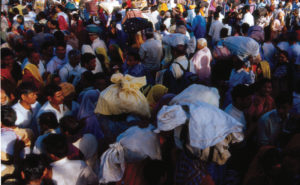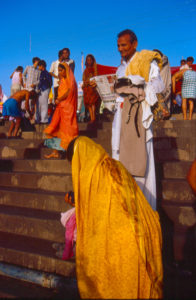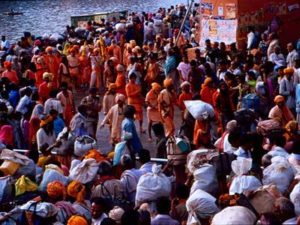
Raman Nanda freelance print, radio, television and internet journalist writes a series on his impressions of the Kumbh.
 Millions of people are making their way to the banks of Ganga in Haridwar for the Kumbh mela, often described as the largest gathering of humans on the planet for a shared objective. They will take dips in the river on auspicious dates beginning on Makar Sankranti, convinced that it will grant them salvation, ‘moksha’. My thoughts go back to the Mahakumbh 2001 in Allahabad where I finally ventured a dip in the dirty, freezing cold waters for – if not salvation – a transformative experience.
Millions of people are making their way to the banks of Ganga in Haridwar for the Kumbh mela, often described as the largest gathering of humans on the planet for a shared objective. They will take dips in the river on auspicious dates beginning on Makar Sankranti, convinced that it will grant them salvation, ‘moksha’. My thoughts go back to the Mahakumbh 2001 in Allahabad where I finally ventured a dip in the dirty, freezing cold waters for – if not salvation – a transformative experience.
While living on the banks of Ganga and filing reports on the event, I was reluctant to take a dip. The water was dirty. People defecated along the banks of the river. The sight of turd was revolting. During strolls in the tent city that sprung up in the plains of Allahabad, one could see only two kinds of people. One stream of people – sullen faced, weak and with a tense defeated look could be seen headed towards the river. The other stream of people – contented, beaming, glowing faces – in a relaxed manner walking away from the river after a dip in the so very dirty waters! That perplexed us journalists.
 I asked a pujari about the holy bath and how should one approach it? “Stand in the river and do ‘aachman’ – collect some water with joined palms and throw it back over your head as an offering to your ancestors. When you dip your head under the water, think about your loved ones. Do take a few dips in the name of friends and relatives who have not been able to make it to the Kumbh!”. Seemed simple.
I asked a pujari about the holy bath and how should one approach it? “Stand in the river and do ‘aachman’ – collect some water with joined palms and throw it back over your head as an offering to your ancestors. When you dip your head under the water, think about your loved ones. Do take a few dips in the name of friends and relatives who have not been able to make it to the Kumbh!”. Seemed simple.
So, on an auspicious bathing day on a freezing cold January morning, I joined the stream of innumerable human beings headed for the river. Wedged by humanity from all sides, I felt I was being carried to the river.
I managed to find standing space in the freezing cold flowing waters. I collected water in my palms and threw it back over my head. I thought of my mother who died many years ago. I remembered accompanying my father to Haridwar to immerse her ashes in Ganga. As I stood there shivering in the freezing cold water I also felt a surge of warmth in my heart as I recalled my mother’s smiling face. I took another dip, this time thinking about my grandfather. I recalled how as a child I used to snuggle in his bed to hear enthralling stories. His ashes too had been immersed in this very river thirty years ago. By now I was feeling the warmth of love from my ancestors, dead years ago, in the flowing water of Ganges. The water ceased to be cold or dirty.
 While underwater, I thought about loved ones: my father, wife, son, daughter, friends and my crush. My father, it dawned on me, will depart one day. I will bring his ashes to these very waters. I will depart. My son will bring my ashes here. My son – only a teenager – too will die. It came through so clearly that we all, after all, are just specks in the continuum of life. It was overwhelming to feel the warmth of love from ancestors across centuries and those near and dear, alive around me.
While underwater, I thought about loved ones: my father, wife, son, daughter, friends and my crush. My father, it dawned on me, will depart one day. I will bring his ashes to these very waters. I will depart. My son will bring my ashes here. My son – only a teenager – too will die. It came through so clearly that we all, after all, are just specks in the continuum of life. It was overwhelming to feel the warmth of love from ancestors across centuries and those near and dear, alive around me.
 Every time I raised my head over water, I noticed thousands others taking dips. I felt even more dwarfed, even more of a speck. For, I was such an insignificant one among millions. I thought to myself: they too must be remembering their ancestors and loved ones. Are they also sensing that warmth of love from those who departed from their lives? I also felt a connect with thousands of people who were taking a dip at that time.
Every time I raised my head over water, I noticed thousands others taking dips. I felt even more dwarfed, even more of a speck. For, I was such an insignificant one among millions. I thought to myself: they too must be remembering their ancestors and loved ones. Are they also sensing that warmth of love from those who departed from their lives? I also felt a connect with thousands of people who were taking a dip at that time.
And, while feeling very much a part of a mass of humanity in a world of love, I felt small, but not vulnerable. I was comfortable with the thought that I, like my ancestors, will perish, as will all whom I love. It also dawned on me: how does it matter whether my endeavours in professional life succeed or fail? Life will go on, as it always has, with a vast flow of love that exists all around us, that has existed within us, for ages. I felt light, almost levitating.
Photo Credit: Alok Johri

Leave a Reply